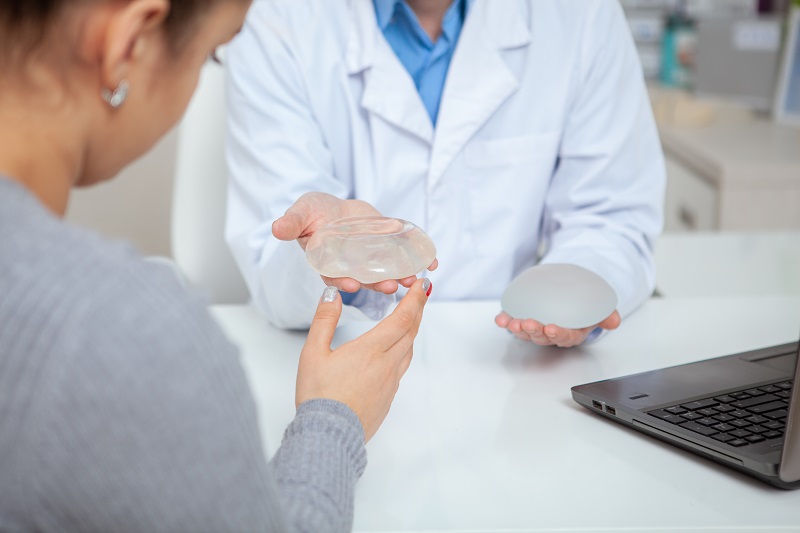Breast reconstruction
Breast reconstruction is a procedure or series of procedures that restores one or both breasts to a natural shape, size and appearance. Many women desire to have their reconstructed breast(s) be similar to their original breast(s), but each patient can choose how she would like the results of her reconstruction to look and feel. If only one breast needs reconstruction, a breast lift, breast reduction, or breast augmentation can be performed on the opposite breast to make the breasts as symmetrical as possible.
Breast reconstruction can help reduce the physical and emotional effects of having partial or all breast tissue removed by restoring a more natural feminine shape to the breast. Choosing to undergo breast reconstruction is a highly personal decision, and patients should make informed decisions about reconstruction based on their own desires rather than outside influences.

Types of breast reconstruction
Breast reconstruction is performed in several steps, and there are essentially two types. Which one is used depends on whether there is enough tissue on the wall of the chest to cover/hold an implant.
Autologous tissue
Autologous-tissue breast reconstruction is used if there is not enough tissue left after mastectomy to create a new breast using tissue expansion, or a woman does not want implants. Factors taken into consideration include how much extra tissue is available for transfer, the width and flexibility of blood vessels, and how large the breast(s) needs to be.
Implant
Implant/tissue-expansion breast reconstruction involves inserting an implant in the chest after the skin has been stretched enough by an expander to contain it. Some patients do not require tissue expansion, which can take up to a year to complete, and begin reconstruction with insertion of the implant.
Mastectomy
Mastectomy is one of the most common treatments for breast cancer, and it involves the surgical removal of breast tissue. Patients who are at a high risk of developing breast cancer may also undergo this procedure as a preventive measure. Depending on the patient’s individual circumstances, breast reconstruction may be performed at the same time as the mastectomy, or reconstruction may be delayed until after the patient has healed and/or additional cancer treatments have been performed.
Nipple reconstruction
Various techniques are available to preserve or reconstruct the nipple and areola. During your consultation, your plastic surgeon will explain the options available to you based on your particular anatomy, tumor location and oncologic surgical plan.

Candidates for breast reconstruction
The ideal candidate for breast reconstruction is a patient who wants to restore their breasts to a natural appearance. This is most often for women who have lost one or both breasts due to mastectomy. Other patients are those who have congenital or developmental abnormalities, including asymmetry between the two breasts.
Candidates for breast reconstruction should be in good health and able to safely undergo the procedure. Those with certain underlying health concerns, such as high blood pressure, should wait until their health is stable to have breast reconstruction surgery. This procedure is not recommended for those who smoke. Ideal candidates must quit smoking at least three to six months before having breast reconstruction.
Breast reconstruction FAQ
How soon after the procedure will I notice the results of my breast reconstruction?
While you will see a significant difference in your figure immediately following your breast reconstruction, it can take several months to see the final outcome. For the first ten days, there will be stitches and surgical drains in place. You will also be required to wear a compression garment around your chest for several weeks. Once removed, the breast tissue needs adequate time to settle and allow for any swelling to subside. Around two to three months after the procedure, you will be able to see the full results of your surgery.
What are the benefits of breast reconstruction?
The breast reconstruction procedure offers several benefits for patients. These include:
- Symmetrical breasts
- Well-proportioned nipples and areolas
- More natural breast shape
- Lifted breast position
Breast reconstruction is particularly beneficial for patients who have undergone full or partial mastectomy. While reconstructed breasts will not be an exact match for natural breast tissue, they can re-create a bust line that helps patients feel satisfied with their figure.
Will I have scars after my breast reconstruction?
The incisions made during breast reconstruction are placed as discreetly as possible to minimize scarring. Incisions made under the breasts are often undetectable, as they are covered by the breasts themselves. The procedure can vary for certain patients, and incisions made elsewhere on the chest may leave minimally visible scarring after recovery.
What kind of results should I expect from breast reconstruction?
A reconstructed breast will not look the same as the original breast. And although a surgeon attempts to match the size, shape, position and other attributes of the remaining breast, an exact match is not possible. To achieve symmetry, the remaining breast may be operated on to make it bigger or smaller, or to lift it.
In addition to not looking the same as the original, a reconstructed breast has little sensation, although there may be more when autologous tissue rather than an implant is used.